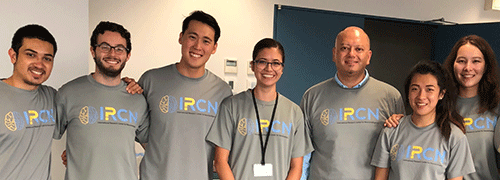Years ago, a Harvard undergraduate named Takao Hensch decided to spend a year conducting research in Japan. But lining up a position overseas proved tricky. “I put it together myself through faculty connections that got me to the University of Tokyo, and it was wonderful,” he says. The experience left such a good impression that Hensch returned to Japan after completing his Ph.D. and helped found the RIKEN Brain Science Institute in 1997.
After almost ten years as a RIKEN principal investigator, Hensch returned to Harvard as an MCB professor but never forgot how studying science abroad shaped him. Today, Hensch serves as coordinator of the Japan Summer Science Undergraduate Research Program (JSSURP). Each year, the program—sponsored by the Reischauer Institute of Japanese Studies—places a handful of Harvard undergraduates in internships in Japanese research labs. There is no language requirement, and the internships last 8 to 10 weeks. Some funding for students can be provided.
Students who are interested in participating in 2020 can attend an information session on October 29th at 4:30pm in Room S250 in the CGIS South building at 1730 Cambridge Street.
The program, which is currently in its 13th year, now encompasses physics and robotics labs as well as life science labs and includes nine sites:
- Hiroshima University
- Okinawa Institute of Science and Technology
- RIKEN Center for Advanced Intelligence Project
- RIKEN Center for Brain Science
- RIKEN Center for Integrative Medical Sciences
- Tokyo Institute of Technology
- Tsukuba University International Institute for Integrative Sleep Medicine
- University of Tokyo International Research Center for Neurointelligence
- University of Tokyo Kavli-Institute for the Physics and Mathematics of the Universe
JSSURP students plan and carry out independent experiments under the supervision of Japanese scientists. “It’s designed entirely around a true laboratory immersion,” says Hensch.
For program alum Sara Trowbridge (Neuro ‘09), who is now a resident in pediatric neurology at Boston Children’s Hospital, spending the summer of 2007 at the RIKEN Brain Science Institute was a life-changing experience. “That was the first summer when I was doing full-time lab research, rather than running back and forth between class and lab, so that experience alone was really important in cementing my interest in neuroscience research moving forward,” she says.
Her future husband—David Mou (Neuro ‘08, MD/MBA ‘14)—was also among the Harvard students abroad in Japan that summer. JSSURP usually sends multiple Harvard students to each site, but, in Trowbridge and Mou’s case, it blossomed into something more.
“Apart from our summer romance, I think the other really memorable aspect of that summer was the lab culture and community,” Trowbridge adds. “The Japanese work ethic is incredible; many of the scientists in the laboratory worked 12-15 hour days, often without taking any or many days off…I worked a lot in the lab as well, because this was the culture. This may sound terrible, but it was actually a really wonderful and immersive experience, and the lab community was very welcoming and close.”
Hensch adds that seeing how other cultures approach topics can deepen a researcher’s capacity to innovate. “Having different perspectives on the same topic is the way you make a new discovery, instead of repeating the same things over and over again,” he says.
JSSURP participants also say that the experience helped them develop new skills and figure out what sort of research they’d like to do going forward. “Not only did I learn a lot of valuable skills in MATLAB and R, I really learned a great deal about myself,” Neuroscience concentrator Diana Wang (‘20) wrote in a blog post for the Friends of Tokyo site. “This research helped me let go some of these heavy biases [about computer science and statistics] that I carried. It allowed me new experiences, it forced me to spend time in fields and learn skills that I would not have easily set aside time for, and it most importantly let me spend time with some incredible people.”
Hensch says JSSURP students also build lasting bonds with their Japanese peers and fellow researchers. “Inevitably, these are your cohorts and peers, who will go up and be your colleagues in the future,” he says.
Most JSSURP students are rising juniors or sophomores, but a few rising seniors have written theses based on data they collected through JSSURP projects. Others have published papers based on their data.
Sending Harvard students can also help the host labs. “[Ten weeks] is just the right amount of time to pilot some new and exciting direction,” he says. He cites Trowbridge, who went to a zebrafish lab and conducted an experiment with shark cells, as an example. “She was so successful, that [the host’s] whole lab started working on this project after she left,” Hensch says. “So it’s a real win-win situation.”
The number of sites participating in JSSURP has grown dramatically in the past 2-3 years. “Word had started to spread that Harvard undergraduates were very talented and willing to come to Japan for science,” Hensch says, explaining that some institutions approached him asking to join the program. He was happy to have new partner sites onboard.
In recent years, Hensch has redoubled his efforts to add more sites, representing more scientific disciplines. To allow greater flexibility, the program is not for-credit, and more students are participating in JSSURP than ever before. 23 students traveled to the sites in 2018.
Although JSSURP has grown, Hensch still personally interviews applicants and helps selected students connect to labs that are relevant to their interests. “It is a matchmaking process, and there is considerable time investment,” he says. “So the earlier they contact me, the better.”
There will be an information session for interested students in the CGIS South building on October 29 from 4:30pm to 6:00pm in Room S250.

Harvard Summer Interns at UTokyo IRCN Summer 2018: (l to r) Mohammad Abdulghani, Justin Sydloski, Kevin Dai, Ellie Underwood, Takao Hensch, Diana Wang, and Lisa Bauer (Uni Utrecht)



